Cries pierced the air as a car full of women and children crossed into Chad from war-torn Sudan. A woman, in the late stages of pregnancy, lay in the backseat, lifeless and soaked in blood. Her children wailed at her feet.
“I sat next to her in the car,” said Butheina Nourin, describing her perilous escape from Sudan’s Darfur region alongside the dead woman. “Her name was Fatima. I don’t know her surname.”
Fighters from the powerful Sudanese paramilitary group, the Rapid Support Forces (RSF), and their armed allies manned checkpoints along their route, Nourin said, demanding money from every passenger in exchange for safe passage.
This brutal method of extortion has become widespread in Darfur, according to dozens of witnesses who recounted similar incidents to CNN.
The vast western region of Sudan is the site of what has been widely described as the 21st century’s first genocide, with largely Arab militias systematically killing non-Arab African groups who make up the majority of the local population.
A growing body of evidence, including first-hand accounts, expert testimony and verified social media video, suggests that the RSF has revived those tactics in Darfur, and exported them to other parts of Sudan as it fights a war with the country’s military.
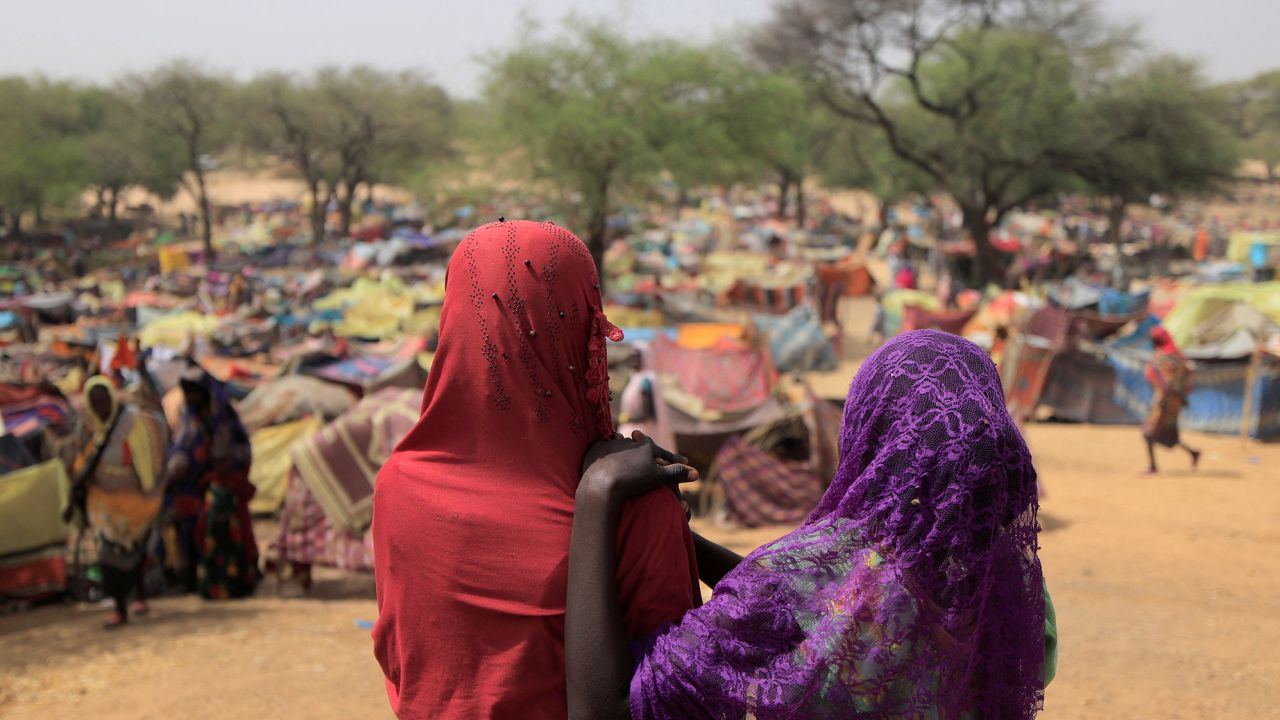
Sudanese girls who fled the conflict in Sudan’s Darfur region, and were previously internally displaced in Sudan, look at makeshift shelters near the border between Sudan and Chad, while taking refuge in Borota, Chad on May 13, 2023. Zohra Bensemra/Reuters
Since mid-April, Sudan’s army chief Abdul Fattah al-Burhan has largely waged his offensive from the sky, aerially bombarding RSF positions in residential areas and inflicting a civilian death toll.
Meanwhile, RSF chief Mohamed Hamdan Dagalo (Hemedti) has strengthened his tactical military positions by driving civilians out of their properties and employing the well-worn playbook developed in Darfur: Kill, terrorize and expel.
Fatima’s story is just one example. Eyewitnesses recalled that, by the time the car carrying her arrived at the last of the RSF positions, she had run out of cash. Only a few kilometers separated her, her two children and her unborn child from the safety of Chad.
“She told the fighters she had spent all her money at other checkpoints,” eyewitness Nourin said. “They shot her immediately.
“The bullet went through one side of her head and exited the other. We all screamed.”
Russia’s mercenaries back Hemedti
The interest, influence and material support of Russia’s notorious paramilitary group Wagner in the region is also exacerbating the violence, CNN has found.
According to intelligence officials, eyewitnesses at key transit points and CNN’s open-source analysis, Wagner has been arming the RSF using supply routes that run through the Darfur region.
“What is not in doubt is Wagner’s role in this, it has been supplying the RSF with arms and supplies through Darfur,” one Western intelligence official told CNN.
“It follows Wagner’s modus operandi. Create chaos and seize power,” another intelligence source active in the region added.
A months-long CNN investigation uncovered an increase in Wagner supplies to the RSF that began in the run-up to Sudan’s conflict. Armaments appear to have been shuttled into Sudan through key transit points: Russia’s air and naval base in the Syrian coastal region of Latakia, Wagner bases in Libya, and Bangui airport in the Central African Republic.
The weapons were also transported into Sudan through overland routes, extending a robust relationship that predated the war, where the country’s military leadership, headed by General Burhan, granted Moscow large concessions in the country’s gold mining industry in exchange for weapons and political backing.
That quid pro quo helped finance Moscow’s full-scale invasion of Ukraine while entrenching Sudan’s military junta, especially Hemedti, who had a meteoric rise to power from a leader of the RSF’s previous incarnation, the Janjaweed.
The Janjaweed – or “devils on horseback” – was later absorbed into Sudan’s security forces. Former dictator Omar al-Bashir gave Hemedti a nickname: Hemayti, “my protector.”
Before Sudan’s current war erupted in mid-April, Hemedti was the second most powerful person in government.
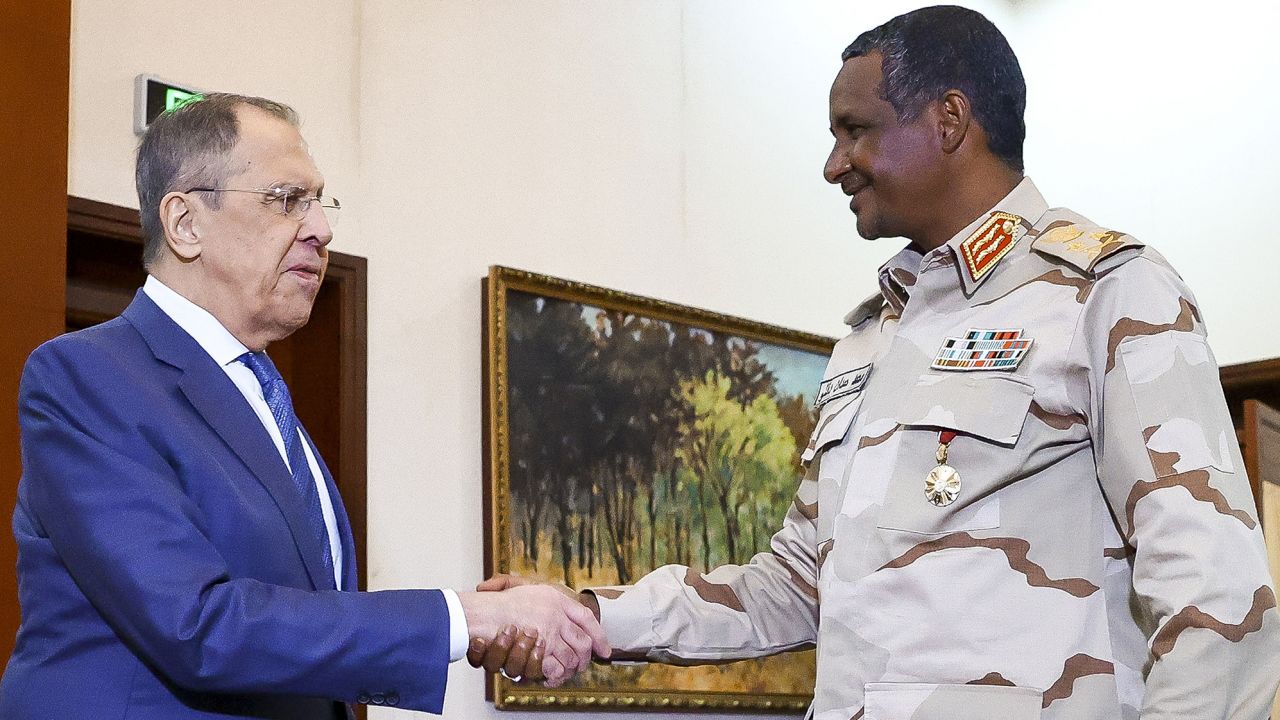
Russian Foreign Minister Sergey Lavrov, left, and General Mohamed Hamdan Dagalo (Hemedti) hold a meeting in Khartoum, Sudan, on Feb. 9, 2023, two months before the conflict broke out. Russian Foreign Ministry Press Service/AP
He allied with his now bitter enemy, Burhan, to stifle a democratic movement that helped overthrow dictator Bashir in 2019. The two generals then aligned to lead a coup against an internationally recognized transitional government in 2021, and crushed a pro-democracy protest movement. More than 100 protesters were killed in the 2021 anti-coup demonstrations.
Their rivalry flared into open warfare in mid-April, and CNN’s reporting has found that Wagner has dropped its wholesale support for the military junta in order to back one side in the conflict – the RSF.
The UN says at least 860 people have been killed since the start of the current conflict, with about 6,000 injured across the country as of June 3. Around half a million people have fled Sudan, with more than 1.4 million internally displaced.
Echoes of ethnic cleansing
A near shutdown in telecommunications in Darfur means that most of the information about the violence now playing out there has trickled out through newly arrived refugees.
Reports of atrocities committed by RSF fighters and their allied militias, clearly identified by their uniforms, are consistent across dozens of testimonies. They include arbitrary killings, the wholesale destruction of vital civilian infrastructure, the looting of homes and hospitals, and even mass rapes.
“I saw the aftermath of torched internally displaced people (IDP) centers and witnessed the RSF raiding residences,” said Hussein Haran, a human rights activist who was in the Darfur city of el-Fasher when the fighting broke out before fleeing to Geneina, another city in the region, and then to Chad.
“Even the hospitals were looted. At Geneina’s research hospital, they stole the blood bank, and they spilled the blood all over the street,” Haran, who works at the Strategic Initiative for Women in the Horn of Africa (SIHA), told CNN.
“The only way I can explain this is that they didn’t want to leave a drop of blood for the ethnic Africans [who claim no Arab ancestry] being treated at the hospital. This is an ethnic cleansing project,” he added.
On Wednesday, the RSF abducted and executed West Darfur Governor Khamis Abbakar, according to the Sudanese military. The RSF denied responsibility for the killing, blaming “outlaws” without providing further detail.
Some claims are nearly impossible to verify during active fighting, but satellite imagery from the area paints a clear picture. At least three cities and 10 towns and villages in Darfur have been partially burned to the ground in the past month alone.
At least one food market in Geneina, which hosts more than 100,000 people internally displaced by violence over the last two decades, has been torched. A school-turned-IDP center was also set alight in the city, according to satellite photographs.
Many of the interviewees depict an emboldened RSF that is better armed than its previous incarnation two decades ago.
“The scale of the fighting in Darfur today eclipses that of the early 2000s,” said Kholood Khair, founder of the Confluence Advisory, a Khartoum-based think tank. “The Janjaweed of 2003 definitely couldn’t have done what the RSF of 2023 has done.”
Khair added: “But having enriched himself and positioned himself so well, despite the tumult of the past four years, Hemedti is in a position where he’s able to do exactly that.”
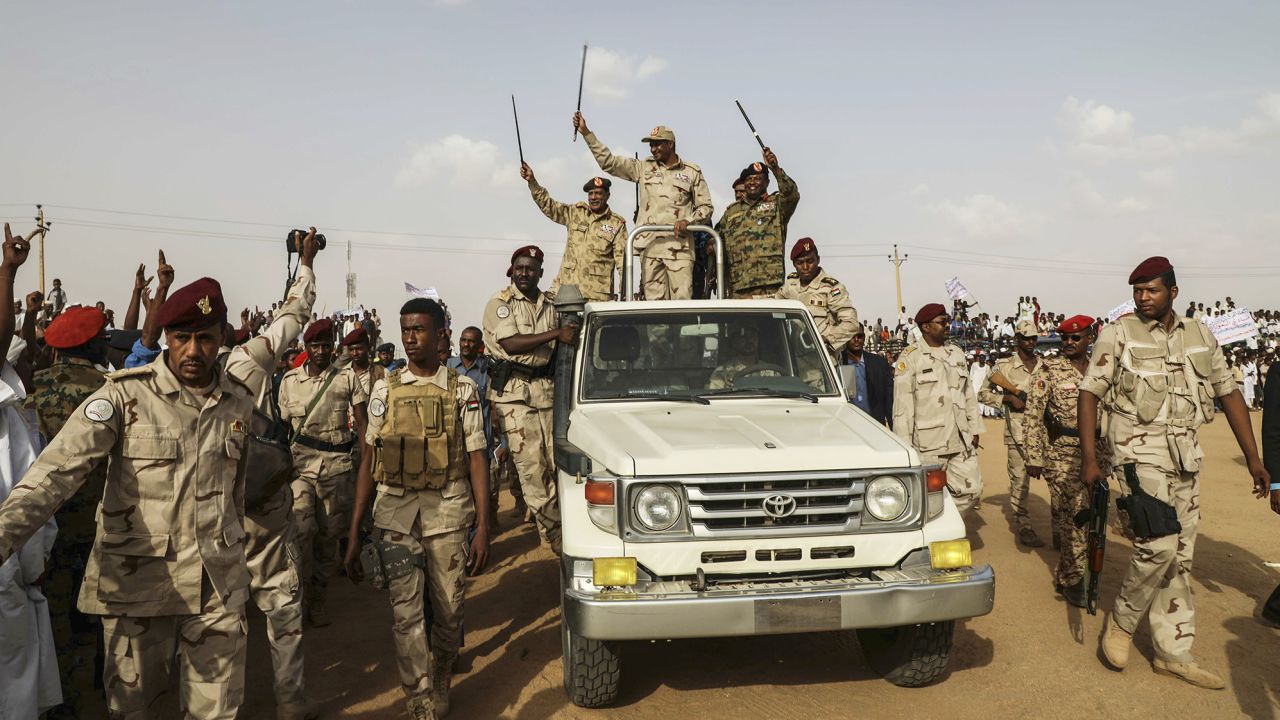
Gen. Mohamed Hamdan Dagalo (Hemedti) waves to a crowd during a rally in the Nile River State, Sudan, on July 13, 2019. Mahmoud Hjaj/AP
More than 300,000 people were killed in the ethnic cleansing campaign by the Janjaweed and its Arab militia allies in the early 2000s. A precise death toll is almost impossible to tally, as many of those killed were dumped into mass graves. Then-President Bashir was charged by the International Criminal Court in 2010 with crimes against humanity, war crimes and genocide in relation to the Darfur conflict. He still has not been handed over by Sudanese authorities to the ICC to stand trial.
Since then, the RSF has extended its reach beyond Sudan’s borders into Libya, and, crucially for Hemedti’s international clout, into Yemen, where the group aided a devastating Saudi and Emirati military effort to crush Iran-backed Houthi rebels.
Hemedti’s power reached new heights after he helped overthrow Bashir in 2019 and went on to become the military junta’s deputy leader. His ties to the United Arab Emirates and Russia appeared to have consolidated his political power and helped turn him into one of Sudan’s wealthiest men.
Verified video of rape in broad daylight
Another characteristic of the ethnic cleansing in Darfur of the early 2000s was mass rapes, extensively documented by experts and rights groups. According to witness testimony, that brutal tactic is back in full force.
“The strategy of raping women has been used extensively by the RSF,” said Hala al-Karib, regional director of women’s rights group SIHA. “The RSF have used it in Darfur to humiliate the indigenous Darfuri population for 20 years.
“The sad part is that they became very comfortable with it because they were never held accountable for it.”
Dozens of incidents of sexual assault, including gang rapes and the assault of female minors, have been confirmed by non-profit groups and experts since the start of the latest conflict. Most of these occurred in Darfur. The United Nations says it has received reports of sexual assault on humanitarian workers in the region.
In late May, the Sudanese government’s Combating Violence Against Women Unit recorded at least 36 cases of sexual assault in the Sudanese capital and 25 cases in Darfur, with 18 perpetrated by men in RSF uniforms.
But Sudanese activists claim that the assaults are much more widespread. In one case described by SIHA, 24 women and girls were abducted at the Daman hotel in south Darfur and repeatedly raped for three days. The oldest woman was 56 years old and the youngest was 14, according to SIHA.
Rapes are also being reported in the capital, where the RSF has repeatedly commandeered people’s homes, expelling the residents and looting their belongings, while combating air attacks by the Sudanese military.
In a video obtained and verified by CNN, one fighter is seen raping a woman in the front yard of a Khartoum home while another, wearing RSF uniform, stands outside keeping watch.
“For the people that say there is no rape, this is rape,” says the person surreptitiously recording the video from across the street.
“And this guy stands there to make sure (the perpetrator) is protected,” the person says, panning to the man wearing RSF uniform and acting as a lookout. “This is happening in public, on a main street and with total audacity and insolence.”
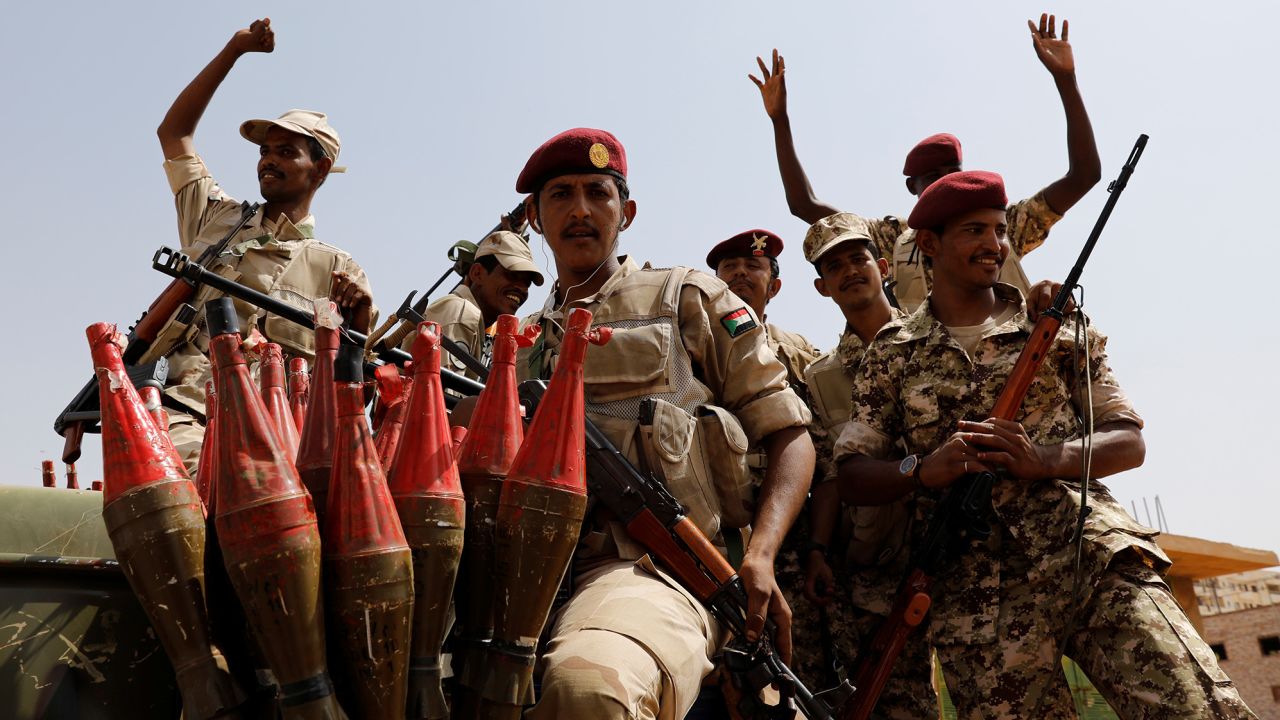
Fighters from the Rapid Support Forces (RSF) which is led by Gen. Mohamed Hamdan Dagalos (Hemedti) in Khartoum, Sudan, on June 18, 2019. Hussein Malla/AP
In a voice recording obtained through SIHA by CNN regarding another incident, a woman in the capital said she was forced to watch as her two young daughters were raped by RSF fighters. “They beat us with weapons,” she said, describing the raid on her home. “We told them we had no money and no gold.”
“They raped my two daughters and they were screaming at the top of their lungs. We were screaming as well,” she said, her voice choked with emotion.
“I had to hold my son back from going to his sisters. I said if you go to them, they will riddle you with bullets.”
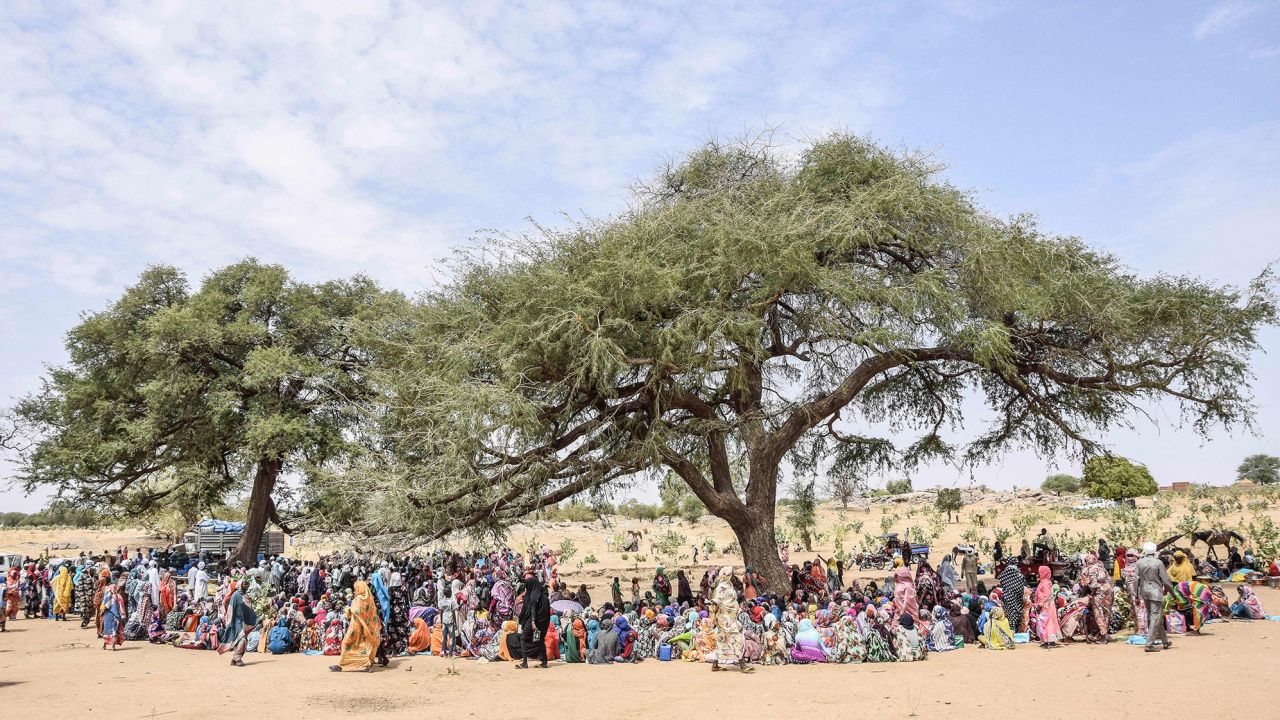
Sudanese refugees who fled the violence and crossed into Chad gather for aid distribution on April 30, 2023. Gueipeur Denis Sassou/AFP/Getty Images
The atrocities have only intensified and proliferated over the course of the war, say activists and experts who argue that impunity has propelled Hemedti’s rise to power since his time as a leader in the Janjaweed in the early 2000s.
“Nobody in Sudan has more blood on their hands than Hemedti,” said Sudan analyst Eric Reeves.
In a statement to CNN, the RSF vehemently denied the allegations of rape, arbitrary killings and targeting of civilian infrastructure. It accused the Sudanese army of “indiscriminately bombing” civilians and claimed that RSF uniforms worn by the perpetrators in witness testimony were “counterfeit.”
“The RSF upholds international law and is dedicated to safeguarding Sudan,” the statement said. “Any actions inconsistent with this principle do not reflect our values, and we are committed to ensuring that those who violate the law are held accountable.”
The group also denied links to Wagner.
Hemedti on the world stage
In recent years, Hemedti has been invited to capitals around the world, including Moscow, Cairo and Abu Dhabi.
He and his forces were further elevated after he cracked down on people-smuggling routes operating from Sudan to Libya, as part of an onward journey to Europe. The European Union has sent at least $200 million to Sudan’s government over the past decade to stem migration.
Hemedti would go on to boast about this in interviews with international media. “[The EU] lose[s] millions in fighting migration, that’s why [it has] to support us,” he told Al Jazeera in 2017.
“The international community created this monster. They are raping women because they can,” women’s rights activist Karib said of the RSF. “They know the ramifications. They know the impact. They know how terrorizing it is. People run away.
“It’s a tried and tested method from Darfur that’s now being used across Sudan.”
In a statement to CNN, the US State Department said it had “received deeply disturbing reports about an increased number of attacks, gender-based violence, including sexual violence … The majority of such acts are reportedly attributable to the RSF.”
The State Department released a strongly worded statement Thursday night condemning atrocities in Darfur.
“Rape, murder, targeted ethnic-based killings, the destruction of whole villages – these are the horrors that the war in Sudan has brought back to Darfur,” a tweet from the State Department’s Bureau of African Affairs said Friday. “Credible sources place blame at the feet of RSF and allied militias. Attacks on civilians in Sudan by any party must end.”
Prior to the publication of its report, CNN shared with the State Department its findings on the extent of the ethnically motivated rapes and atrocities being committed by fighters from the RSF and their armed allies.
A ‘bigger and badder’ Hemedti
The fear now among the Sudanese and some in the international community is that Wagner’s involvement in the war has helped make Hemedti “bigger” and “badder.”
“The reality is that Hemedti is incredibly useful to Wagner,” the Western intelligence official told CNN. “He has tribal and kinship links across Africa and there is incredible concern about the damage that a bigger, badder RSF – emboldened and supported by Wagner – could wreak not just in Sudan but in the entire region.”
Wagner’s presence in and financial interests in Africa are well documented, but the violence in Sudan appears to have given the group a fresh opportunity.
Wagner chief Yeveny Prigozhin did not directly address CNN’s request for comment on Wagner’s support for the RSF and its role in fueling the current atrocities.
In a sarcastically worded statement, he said Wagner had trained all the military bodies in Sudan, including the RSF, and blamed American interference for the country’s current turmoil. He claimed there had been “no sexual crimes in Sudan” while Bashir was in power.
The State Department also acknowledged Wagner’s involvement in Sudan. “Engagement with the Wagner group simply brings more death, destruction and instability,” the statement said.
Meanwhile, the violence continues to intensify with no sign yet that the diplomatic process between the rival factions will bring a permanent end to the conflict. The Sudanese must fend for themselves, while they face what they describe as the hallmarks of genocide.
“The situation right now is much worse than it was in 2003. The Janjaweed militia was not as powerful as it is now,” said SIHA’s Darfur-based Hussein Haran.
“The RSF is as powerful as the state. They have much more power now and more capabilities… and they are committing genocide and ethnic cleansing.”
Source: Cable News Network


